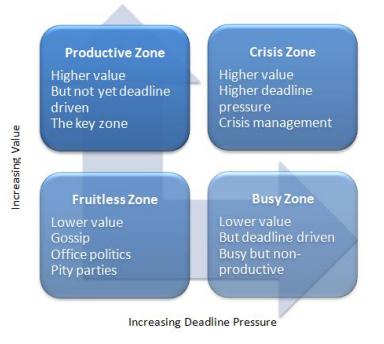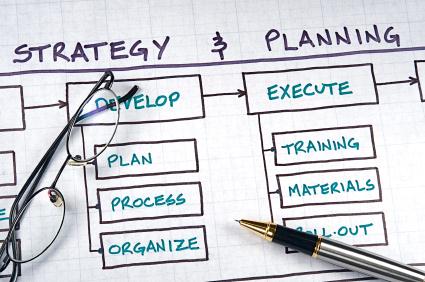MIND takes precedence over mood.
In other words - if you know you should do it, but you are not in the mood, then do it anyway!
If you ever hear yourself say: “I know I should. I know I could, but I am not in the mood, so I won’t.” Then realise you have made a major mistake.
This point has three implications:
1. As a rational planner use logic to determine the correct order of tasks.
2. From now on, strive to do what you know you should do, even if you are not in the mood.
3. I evaluate the task itself, not the person asking you to do the task.
What happens to a person who prioritises tasks according to their mood? I.e. they will only do
the job if they are in the mood.
As a rational logical person, you should judge tasks according to 1. VALUE of the task
2. DEADLINE PRESSURE of the task
If you make a graph with the axis being Value and deadline pressure, you get following.
T: 01452 856091 E: info@CorporateCoachGroup.co.uk W: www.CorporateCoachGroup.co.uk Corporate Coach Training Ltd t/a Corporate Coach Group, Walcot House, Parton Road, Churchdown, Gloucester, Gloucestershire, GL3 2JJ
Registration Number: 06490932 VAT Number: 741630356
Page 17

Q1 Crisis Zone
Q2 Productive Zone
Q3 Fruitless Zone
Q4 Busy Zone
You do not have the time to do everything, so select the most productive, high value work Q1 and especially Q2.
Is there a difference between “busy” and “productive”? If so, what is it?
1. Business is a measure of.......................................
2. Productivity is a measure of................................
Think about this statement.
Many people are too busy to be at their most productive.
Busyness is not a virtue - it is very easy to be too busy! It is not possible to be too productive.
Distinguish between being “busy” and “productive” - busy is “a measure of activity” whereas productivity is “a measure of achievement”.
T: 01452 856091 E: info@CorporateCoachGroup.co.uk W: www.CorporateCoachGroup.co.uk Corporate Coach Training Ltd t/a Corporate Coach Group, Walcot House, Parton Road, Churchdown, Gloucester, Gloucestershire, GL3 2JJ
Registration Number: 06490932 VAT Number: 741630356
Page 18
Let us define the four types of work
Q1 Crisis
High Value/High Deadline pressure – we all get this sometimes. The question is, how much time is spent in crisis? In Q1 Crisis zone, tasks have to be done to the highest standards and finished yesterday. In this zone there is pressure, stress and a greater likelihood of error. This zone is called the crisis zone.
Other people create some of your Q1 activity. But some may be cause by an earlier failure to complete Q2 activity.
Q2 productive
High value/Low deadline pressure – these tasks have high importance, but are not yet pressing. They therefore need to be planned for and a strategy worked out. They may require a larger degree of time and resources allocated to them in order to ensure high quality. This is where you are at your most efficient and productive.
These activities increase efficiency, reduce future errors and improve systems. This is why this is called the Q2 Productive Zone.
Q3 busy
Low value/High deadline pressure – these tasks are urgent, so they can feel more valuable than they actually are. You should limit the amount of time spent on them. Delegate these if possible. If not possible, restrict the amount of time spent on each ask. You need the time for Q 2. If you spend too much time here, you will be rushed off your feet, accomplishing little (busy but non-productive) This zone is called the Busy Zone
Q4 fruitless
Low value/Low Urgency – if a task is neither urgent nor important; maybe you shouldn‟t do it at all.
Q4 activity is relatively a waste of time so should be kept to a minimum. This zone is therefore called the Fruitless Zone
Four Implications:
1. Your goal is to reduce Q1
2. You do that by spending at least 50% of your work time in Q2
3. You do that by managing Q3. Avoid being caught up in Q3. You will be busy but not productive.
4. Do not waste time in Q4. Pay Q2 instead.
T: 01452 856091 E: info@CorporateCoachGroup.co.uk W: www.CorporateCoachGroup.co.uk Corporate Coach Training Ltd t/a Corporate Coach Group, Walcot House, Parton Road, Churchdown, Gloucester, Gloucestershire, GL3 2JJ
Registration Number: 06490932 VAT Number: 741630356
Page 19

What Q2 productive jobs do you put off until they become a crisis?
1. Which “health issue” tasks do you put off until they become a crisis?
2. Which “long range goal” tasks do you put off until they become a crisis?
3. Which “important but tedious record keeping” task do you put off until they become a crisis?
You cannot avoid doing pressure (Q1) work but you must manage busy (Q3) time.
1. Who in particular are the people who continually interrupt you and put you in the busy zone or the fruitless zone? What are you going to do to stop them?
2. What personal habits put you in the busy or fruitless zone? How can you stop them?
3. What is there in the system or office layout that wastes time? How could you change it for the better?
T: 01452 856091 E: info@CorporateCoachGroup.co.uk W: www.CorporateCoachGroup.co.uk Corporate Coach Training Ltd t/a Corporate Coach Group, Walcot House, Parton Road, Churchdown, Gloucester, Gloucestershire, GL3 2JJ
Registration Number: 06490932 VAT Number: 741630356
Page 20
Reason as a means of resolving conflict
Everybody has to handle conflict at some time.
Occasionally, people fail to do what they should, or they do things they should not. Then you have to give “critical feedback”, you need to be able to put people back “on track” - but how “critical feedback” is delivered is important.
If a critical feedback message is handled crudely, bad feelings and resentment build up. If you fail to give the feedback for fear of risking confrontation, productivity suffers and onlookers lose respect for you. The critical feedback issue is a big problem for many people. In short; they have never learned how to do it.
Why is rational feedback important?
Rational feedback is important because blindness to bad behaviour is a formula for failure. Some people, hoping to avoid conflict, ignore bad behaviour in the hope that it will go away…it won’t!
Untreated, bad behaviour of a minority becomes a habit and causes resentment in the team members who are doing it right. Bad behaviour must not be left; it must be treated carefully, according to the seven principles that follow:
Get the timing right
Say it soon. Do not leave bad behaviour to fester. Do not “save things up” and blast people for long-past wrongs. Instead, say your message as soon as practicable after the event, preferably face to face and in private.
Keep it specific to particular quality standards. Do not emotionalise.
Be objective in your language, not subjective. “Objective” means state only direct facts, not your evaluative comments or feelings flowing from the facts.
For example, “You were twenty minutes late for the meeting” is objective (and a good use of language). “I‟m furious, you were late for the meeting, that‟s totally unprofessional” Is subjective, and liable to provoke a hostile reaction!
Protect the person‟s self-image
People tend to act in accordance with their self-image. Those with a good self-image perform well, have good relationships and are productive. Those with a poor self-image act badly, have fraught relationships and are non-productive. So, it makes sense to build the self-image of those around you.
When you need to criticise anyone, restrict yourself to talking about behaviour, not the character of the person.
“Behaviour” is what the person says and does.
“Character” is “the kind of person you think his behaviour makes them”
T: 01452 856091 E: info@CorporateCoachGroup.co.uk W: www.CorporateCoachGroup.co.uk Corporate Coach Training Ltd t/a Corporate Coach Group, Walcot House, Parton Road, Churchdown, Gloucester, Gloucestershire, GL3 2JJ
Registration Number: 06490932 VAT Number: 741630356
Page 21
Be critical of another‟s behaviour, but if you criticise who they are, you will either
Undercut the person‟s self-confidence or
Provoke an angry defence.
In either case, you lose.
So do not use negative actions to justify an attack on the character.
Instead, state only the behavioural facts.
Your goal is always to preserve the self-image, whilst at the same time commenting on negative behaviour.
Be specific about what you expect
Too many people focus on telling the other what they do not like and why - telling a person what you do not like is never enough on its own. Instead, focus on what you think would be better.
You should tell them clearly, what you would like to see in place of what they are doing now.
You should always know what alternative behaviour you expect from the other. Work it out before you speak.
Distinguish between reasons and excuses
Is there a difference between a “reason” and an “excuse” for not doing something?
You bet there is a difference! A reason is true, logical, based on fact, undeniable and unavoidable. An excuse is none of these. (i.e. an excuse is untrue, illogical, dishonest or feeble) What if you ask a person to change, and they say “no”? You will ask “why not?”
When that person answers, listen closely because you have to classify their answer into one of two groups. You will hear either:
The reason they cannot change, or
The excuse they use to avoid changing.
In your own mind, when you listen to others, do you consciously distinguish between reasons
and excuses?
What happens to the person who does not distinguish between reasons and excuses?
Who should decide for you what constitutes a reason and what is an excuse in any particular
case?
T: 01452 856091 E: info@CorporateCoachGroup.co.uk W: www.CorporateCoachGroup.co.uk Corporate Coach Training Ltd t/a Corporate Coach Group, Walcot House, Parton Road, Churchdown, Gloucester, Gloucestershire, GL3 2JJ
Registration Number: 06490932 VAT Number: 741630356
Page 22
Your policy towards reasons and excuses should be different.
If you think the person is giving good reasons, then you should negotiate a good compromise solution. There is no sanction.
If you think you are hearing unreasonable excuse, do not negotiate!
Never negotiate with a person who offers only excuses. You should earn a reputation for being a person that responds only to reason.
What happens to team standards if anyone can come up with any excuse not to do something,
and as a result, gain concessions?
Check your facts before the session
Beware of criticising another person before you have all the facts.
If you speak too soon, on assumption, guesswork or rumour, you may cause resentment in the mind of your listener based on an injustice. This is dangerous in teams because a perceived injustice is a major de-motivator. Instead, check the facts before you speak.
The “best kind of fact” is always direct sense experience. (I saw you X, I heard you say Y)
Be wary of indirect or second-hand facts. If in doubt, check it out.
Have you ever known someone be unjustly criticised? How did they react?
Give honest and sincere appreciation for good work
Fundamentally, we work in exchange for money, but money is not the only motivator. Other people, what they say and how they behave, motivate people. Social motivations are an important element in successful teams.
Good teams have a culture of self-motivation through mutual praise and encouragement. They also give praise and thanks upwards as well as downwards.
Bad teams have a culture summed up in the phrase: “Why should I appreciate him? He is getting paid, isn’t he? ”
T: 01452 856091 E: info@CorporateCoachGroup.co.uk W: www.CorporateCoachGroup.co.uk Corporate Coach Training Ltd t/a Corporate Coach Group, Walcot House, Parton Road, Churchdown, Gloucester, Gloucestershire, GL3 2JJ
Registration Number: 06490932 VAT Number: 741630356
Page 23
Do you ever hear this complaint “I always get told when things go wrong but I never hear
anything when things go right”. If yes, what effect does this have on motivation?
Have you ever put in an extra effort to achieve a good result, and then not received a word of
appreciation from others. How did that effect your motivation?
It is important to praise others for good work, and remember:
The lack of appreciation is not a neutral. It is an enormous de-motivator.
So … catch people doing it right!
1. Appreciation for good work is essential but often forgotten 2. Tell people when they have got it right
3. Do it now, don‟t wait
4. Use achievement to build self-concept
5. Praise up the hierarchy as well as down
T: 01452 856091 E: info@CorporateCoachGroup.co.uk W: www.CorporateCoachGroup.co.uk Corporate Coach Training Ltd t/a Corporate Coach Group, Walcot House, Parton Road, Churchdown, Gloucester, Gloucestershire, GL3 2JJ
Registration Number: 06490932 VAT Number: 741630356
Page 24

“Emotional Management” – Inspiring Positive Feelings
One of your important roles is to be a source of strength for other team members.
This generates positive emotions such as enthusiasm and motivation in a team and creates a sense of self-esteem and pride based upon productive achievement.
Sometimes, a team member has a negative attitude, which acts to dampen down the spirit of the team. This is bad, because a dispirited team is less productive and less able to solve problems.
There are two aspects to the management of emotion:
1. The ability to inspire yourself
2. The ability to inspire others
The ability to inspire yourself comes first. Then comes the ability to inspire others. Why does it
have to be that way round?
Here are two ideas under the general heading of “How to inspire a positive attitude”
1. Positive evaluation questions
2. Physiology first
Let‟s take the first idea:
T: 01452 856091 E: info@CorporateCoachGroup.co.uk W: www.CorporateCoachGroup.co.uk Corporate Coach Training Ltd t/a Corporate Coach Group, Walcot House, Parton Road, Churchdown, Gloucester, Gloucestershire, GL3 2JJ
Registration Number: 06490932 VAT Number: 741630356
Page 25

Positive evaluation questions
Have you ever heard a person say, “Rain makes me feel miserable” or “Rain makes me feel good”?
Most people speak in terms that say, “X makes me feel Y”. Now, ask yourself, can rain make a person happy or miserable? Be clear on this. Is there a direct cause- effect relationship between “rain” and
“miserable”?
Look around your office on a rainy afternoon; wouldn‟t you see a range of responses? Some would be miserable. Some delighted. So, the “Thing in reality” cannot cause the emotional response - X (out there) does not make you feel Y (in here).
If the outside environment is not the cause of an emotion, then what is?
The cause of the emotion is the evaluation of the fact.
You respond emotionally to the meaning of the event - not the event itself.
You cannot control the event, but you can control the meaning of the event.
So you can control how you will react.
T: 01452 856091 E: info@CorporateCoachGroup.co.uk W: www.CorporateCoachGroup.co.uk Corporate Coach Training Ltd t/a Corporate Coach Group, Walcot House, Parton Road, Churchdown, Gloucester, Gloucestershire, GL3 2JJ
Registration Number: 06490932 VAT Number: 741630356
Page 26
“An emotion is a physiological and mental reaction to the evaluation of an event, or idea“
Imagine you see a person who is miserable about a certain fact? You want to make the person feel better. You could take that fact away. But what is wrong with this approach to managing emotions?
“Spiders make Jon unhappy. Let’s get rid of all the spiders.”
The problem is: facts are facts. Sometimes the thing that “makes you unhappy” is a fact that will not go away.
“Spiders make me unhappy. There are always lots of spiders. So I can never be happy”
If you cannot “make it go away”, and you want to feel better, your best approach is to: Change your current method of evaluating the facts.
Facts do not cause feelings - evaluations cause feelings.
Change the evaluation, and you‟ll change the emotion.
As the leader manager; your challenge is to change the meaning of an event by offering more inspiring interpretations to the facts.
Strive to help others evaluate things in such a way that they feel productive and happy, no matter what is going on “out there”.
So now the question is, “How can I change the way a person evaluates an event?”
If emotions hinge on evaluations, let us ask “What is an evaluation”?
When you evaluate something, you ask and answer questions about it. An evaluation is a series of questions; the quality of the questions determines the quality of the answers; the quality of the answers determines the emotions.
Therefore, and this is a key point:
The quality of the questions determines the emotions.
Given the same set of facts, some questions will lead to negative emotions and inaction. Other questions will lead to positive feelings and goal-focused action.
What would be an example of “negative feeling inducing questions”?
T: 01452 856091 E: info@CorporateCoachGroup.co.uk W: www.CorporateCoachGroup.co.uk Corporate Coach Training Ltd t/a Corporate Coach Group, Walcot House, Parton Road, Churchdown, Gloucester, Gloucestershire, GL3 2JJ
Registration Number: 06490932 VAT Number: 741630356
Page 27
Imagine you have just discovered you are not ready for an important presentation because another person had failed to supply you with a piece of information. You are feeling bad and frustrated. Then your friend asks you these questions:
What is wrong?
Who caused it?
Why did (he/ she) do that?
Why do you seem to get all the bad luck?
Why didn‟t you anticipate it and prevent it?
What punishment would be fair?
How does all this make you feel?
Fancy a drink?
Having answered these questions, what state would you be in?
How much closer to a solution would you be?
These questions are characterised by being:
1. Focused on the past.
2. How this “makes you feel”.
3. Blame.
Important point: Don‟t ask yourself questions that focus your mind on: 1. The past
2. Who to blame
3. How you have the right to feel miserable.
Instead, ask yourself “positive feeling inducing questions”. What would be an example of “positive feeling inducing questions”?
Imagine the same scenario but this time your friend asks: 1. What‟s up?
2. Given the situation is what it is, what is your most optimistic but realistic goal?
3. What would be a good plan?
4. Who could help?
5. What will you need?
6. What is the very first thing to do?
7. When should we start?
Having answered these questions, what state would you be in?
How much closer to a solution would you be?
T: 01452 856091 E: info@CorporateCoachGroup.co.uk W: www.CorporateCoachGroup.co.uk Corporate Coach Training Ltd t/a Corporate Coach Group, Walcot House, Parton Road, Churchdown, Gloucester, Gloucestershire, GL3 2JJ
Registration Number: 06490932 VAT Number: 741630356
Page 28
These questions are characterised by being:
1. Focused on the future.
2. Thoughtful planning.
3. Action centred.
There are many good questions. There are many bad questions, that don't need an answer: In fact, even asking the question is a mistake. I call these questions: KILLER Questions What is a killer question?
A killer question is a question that presumes a falsehood, or has no valid answer, or the answer itself is a waste of time or is counterproductive.
Killer questions are “killer” because, even in the act of answering them, you tend to make life WORSE
for yourself and others.
What are examples of killer questions?
There are a great many. Here are some candidates:
1. I wonder what happens if I press this?
2. How many beers can I drink, and still drive home safety?
3. How can I cheat and not get caught?
4. What is on TV tonight?
5. Who do you blame for your lack of progress?
6. You look really terrible. What‟s wrong?
There are many other killer questions: Can you think of any?
Remember the definition:
A killer question is a question if, in the act of answ







